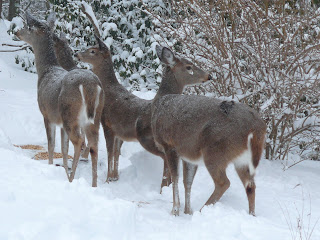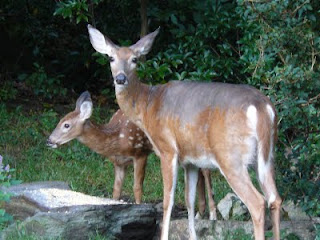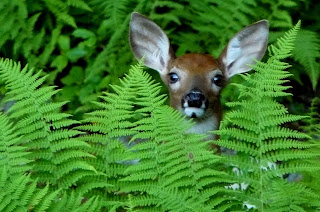Sunday, December 20, 2009
Winter Storm Albert - 12+ inches in Shelton
We had a busy morning today cleaning off all the bird feeders and the deer feed station. Everyone was happy to get feed today!!!

Labels:
Apple,
Cider and Spicy,
Pie
Saturday, November 14, 2009
Sunday, October 4, 2009
Marbled Orbweaver Spider
A couple of very pretty Marbled Orbweaver spiders...One enjoying lunch!!
Adult female marbled orbweavers are 9 to 20 millimeters in length with very large abdomens that are mostly orange with brown to purple markings and spots of pale yellow.
Adult female marbled orbweavers are 9 to 20 millimeters in length with very large abdomens that are mostly orange with brown to purple markings and spots of pale yellow.
Egg cocoons, which contain several hundred eggs, are generally deposited in October and are constructed of white silk formed in a flattened sphere. Immature spiders emerge from the cocoons in spring. Adults are seen from midsummer until the first hard freeze of fall.
Saturday, September 19, 2009
Young Skunk
This little guy came out of the woods around 5:45pm and ran right into the garage. He soon came out and then went straight to the feeding station in the back yard. He seemed to enjoy getting pieces of suet that the birds were dropping from the suet feeder. He stayed about 40 minutes.
Sunday, September 13, 2009
Turkey with youngsters...plus a surprise visitor!!
While filming this video, an unexpected visitor showed up.
Monday, September 7, 2009
Friday, August 28, 2009
Coat Transition


These photos of Apple and Pie, taken Aug. 26th, show how Apple's coat is beginning to make the transition for the coming winter. Her reddish-brown spring coat is making the change to grey-brown.
Monday, August 24, 2009
Another Surprise!!
This morning, one of our "regulars", Nutmeg, brought her 2 new fawns. This is the first season she has given birth and we were surprised to see twins. We have never had so many fawns in one season. To recap:
Apple's fawn is named Pie
Cider's fawn is named Spicy
Nutmeg's fawns are Cinnamon & Clove
Here are Nutmeg, Cinnamon and Clove....


Wednesday, August 19, 2009
The Whole Family Together
For the first time, both Apple and Cider brought their fawns (Pie and Spicy) to the feeding area at the same time. I couldn't get a photo of the group, but here is a video.
Sunday, July 5, 2009
New Arrival - Apple's fawn
About 6am this morning, we had a quick glimpse of Apple's fawn. This was the first time she brought her fawn to the property. Upon going out to deliver the morning breakfast of deer feed and apples, our other resident deer, Nutmeg, was already at the feeding station. Nutmeg's presence seemed to make Apple nervous and Apple took her baby back into the woods. We have named the new fawn Pie.




Sunday, June 21, 2009
Rose Breasted Grosbeak


BREEDING: Deciduous forest, woodland, second growth. 1 or 2 broods. Mating system is monogamous.
DISPLAYS: Courtship: male sings in flight pursuit of female; male crouches, spreads and droops wings with tail spread and slightly elevated, retracts head with nape against back; male sings and waves head and body in erratic dance.
NEST: Loosely built of twigs, coarse plant material, lined with fine twigs, rootlets, hair. Cup shaped nest, 5-15 feet above the ground. Male may select site. Female builds nest with help from male.EGGS: 3-5 pale green, blue, or bluish-green, marked with browns, purples; usually wreathed or capped. 1.0" (25 mm).
CHICK DEVELOPMENT: Both sexes incubate. Incubation takes 13-14 days. Development is altricial (immobile, downless, eyes closed, fed). Young leave the nest after 9-12 days. Both sexes tend young.
DIET: Insects, seeds, fruit, buds. Including some flowers. Occasionally gleans from ground.
Eastern American Toad
They are common in gardens and agricultural fields. During daylight hours they seek cover beneath porches, under boardwalks, flat stones, boards, logs, wood piles, or other cover. They are easy to find and their gentle nature makes them good pets. When cold weather comes, these toads dig backwards and bury themselves in the dirt of their summer homes, or they may choose another site in which to hibernate
Sunday, June 14, 2009
Spotted Turtle
June 14th: Today we were very excited to find a spotted turtle in the yard. Every June they come to our backyard to nest. Whenever we find a spotted turtle we take a picture of the plastron (underneath shell) for identification. This little lady was first observed nesting on our property in 2005. In 2006 I was lucky to actually observe her laying 3 eggs. They all hatched in late September. Spotted Turtles reach sexual maturity between 7 to 10 years, and they can live to reach 30 years!
Thursday, April 23, 2009
Blue Bird - A Sure Sign of Spring!!!

We have several Blue Bird nest boxes in the yard but no one has ever taken up residence....the boxes are usually taken over by our Downey Woodpeckers.
Subscribe to:
Posts (Atom)





































